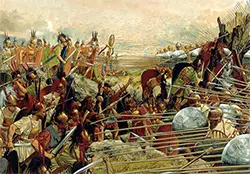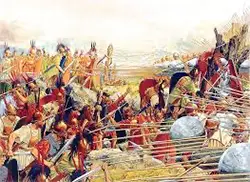The Roman Conquest of Greece
Rome and Greece went to war several times during the span of a century during the days of the Roman Republic. Rome emerged victorious in 146 B.C. and annexed Greece. Since the conquest of Greece by Alexander the Great, Macedon had ruled Greece to a greater or lesser extent. Roman and Greek forces had first come to blows officially in the First Macedonian War, when Philip V of Macedon agreed to an alliance with the Carthaginian commander Hannibal while Carthage and Rome were fighting the Second Punic War. 
The following year, Macedon launched an invasion of Illyria, echoing actions he had taken a few years earlier. The Romans, acting quickly and decisively, surprised Philip's army and sent it back to Macedon. Philip himself made it home, but his decision to burn his ships ended up stranding a large number of his soldiers, who were taken by Rome and either captured or killed. The struggle with Rome continued, even as Roman armies kept on falling in defeat to those of Hannibal. Roman actions in the east encouraged several Greek lands to oppose Philip. After a series of struggles and an aborted peace attempt, Philip found himself having a brush with death. In an attack on the city of Elis, he was thrown from his horse and survived by fighting on foot and leading his men to victory. In a subsequent attack, he routed his main opponent, Attalus, who fled. Gaining the upper hand, Philip carried on his attacks and seized a handful of other towns. Eventually, Rome sued for peace, and a treaty in 205 B.C. ended the First Macedonian War. The second war between Macedon and Rome was shorter in duration but more consequential in outcome. Rome defeated Carthage in the Second Punic War, which ended in 202 B.C. Two years later, Rome declared war on Macedon. Philip, meanwhile, had been focused on the east, campaigning in Egypt and in the Dardanelles. He returned to Macedon about the time that a Roman force headed that way. By this time much improved in battle, the Romans had success after success against Philip. Rome fashioned multiple avenues of attack, with the consul Sulpicius invading northern Macedonia in 200 B.C. and then another consul, Flaminius, invading Thessaly two years later. As well, Roman ships allied with an Athenian fleet for naval actions. 
Another peace attempt resulted in nothing, and the two sides continued the fighting. Flaminius proved the better of Philip, Roman legions again besting Greek phalanxes. Building in experience and allies, the Roman army confronted the Macedonian force in Thessaly in 197, in the epic Battle of Cynoscephalae. Employed by Flaminius on the Roman side were 25,500 men and 20 war elephants; Philip countered with a force of 26,000. In a muddy, messy affair, Flaminius led his troops to a convincing victory, sending the Macedonians fleeing from the battlefield. Philip's casualties numbered in the thousands; Roman casualties numbered in the hundreds. A peace agreement followed, and Philip paid a heavy prices–in both money and prestige–for opposing Rome. In addition, Philip agreed to send some of his own troops to aid Roman war efforts. Philip also enjoyed the nominal alliance with Rome by attacking a handful of city-states in central Greece. When Philip V died, in 179 B.C., his son Perseus set about trying to solidify his hold on power. He kept control of Macedon for a time, but his land and Rome were at war again by 171 B.C., largely because of Perseus's desire to avenge his father's defeat. The two sides fought each other to a standstill at Callinicus in the first year of the war. The Macedonians made gains in the second year of the war, seizing cities and fighting off Roman attempts to gain ground. The script flipped in the next year of the war, as Perseus went so far as to pursue peace negotiations. Those talks came to nothing, and the war continued, albeit intermittently. One significant development that the Romans, in Thessaly, had crossed the mountain passes toward Macedon. In the fourth year of the war, 168 B.C., Perseus gained an ally in King Gentius of Illyria. This king pledged a large army to the Macedonian cause and set about attacking cities allied to Rome. The army was successful at first but, when defeated once by Roman armies, holed up in a fortified city and A fourth Macedonian War occurred nearly two decades later. Andriscus, who made it known that he was the son of Perseus, fashioned an army around his fake identity and led it into battle against Rome. Andriscus and his new Macedonian army had some successes against Rome but not enough to make Rome sue for peace. A second battle at Pydna, in 148 B.C., went overwhelmingly Rome's way, and Macedonia ended up as a Roman province.  The final conquest of Greece by Rome came two years later. The Achaean League, a confederation of Peloponnesian states, rose up against Rome in 146 B.C. The League had considered allying itself with Perseus during the previous war but had decided not to do so; Rome seized thousands of hostages from League cities in order to make sure that League leaders didn't change their mind. Relations between the League and Rome soured and then devolved into warfare. The struggle was short and decisive, ending in a quick Roman victory at the Battle of Corinth. Rome then razed the city as further punishment and annexed Greece. |
|
Social Studies for Kids
copyright 2002–2025
David White



 then, rather than taking advantage of the city's walls, rode out to meet the Romans on the open plain and was defeated. Perseus, meanwhile, confronted Rome at the Battle of Pydna. The Macedonian phalanx held the Romans at bay for a time but was eventually undone by the unevenness of the ground, which forced the members of the phalanx to shift their positions in order to keep from falling and, in so doing, move their shields and/or their spears out of the tight formation for which the phalanx was so well-known and so devastatingly effective. The legion, which allowed its soldiers more freedom to move and respond individually, proved more effective, and the Romans broke down the Macedonian defense little by little and then in large push. Macedonian losses numbered 25,000; Roman losses were much, much fewer. Perseus fled into the countryside but was captured and sent to Rome; he died in captivity. Victorious Rome divided Macedonia into four semi-autonomous republics. Into Illyria, which had allied itself with Macedon, Rome sent bands of soldiers to plunder the cities and countryside and then therein placed garrisons.
then, rather than taking advantage of the city's walls, rode out to meet the Romans on the open plain and was defeated. Perseus, meanwhile, confronted Rome at the Battle of Pydna. The Macedonian phalanx held the Romans at bay for a time but was eventually undone by the unevenness of the ground, which forced the members of the phalanx to shift their positions in order to keep from falling and, in so doing, move their shields and/or their spears out of the tight formation for which the phalanx was so well-known and so devastatingly effective. The legion, which allowed its soldiers more freedom to move and respond individually, proved more effective, and the Romans broke down the Macedonian defense little by little and then in large push. Macedonian losses numbered 25,000; Roman losses were much, much fewer. Perseus fled into the countryside but was captured and sent to Rome; he died in captivity. Victorious Rome divided Macedonia into four semi-autonomous republics. Into Illyria, which had allied itself with Macedon, Rome sent bands of soldiers to plunder the cities and countryside and then therein placed garrisons.
